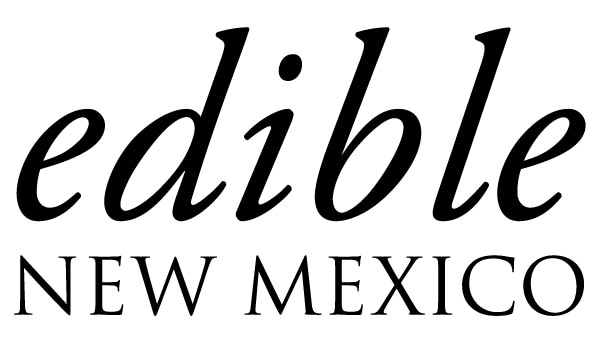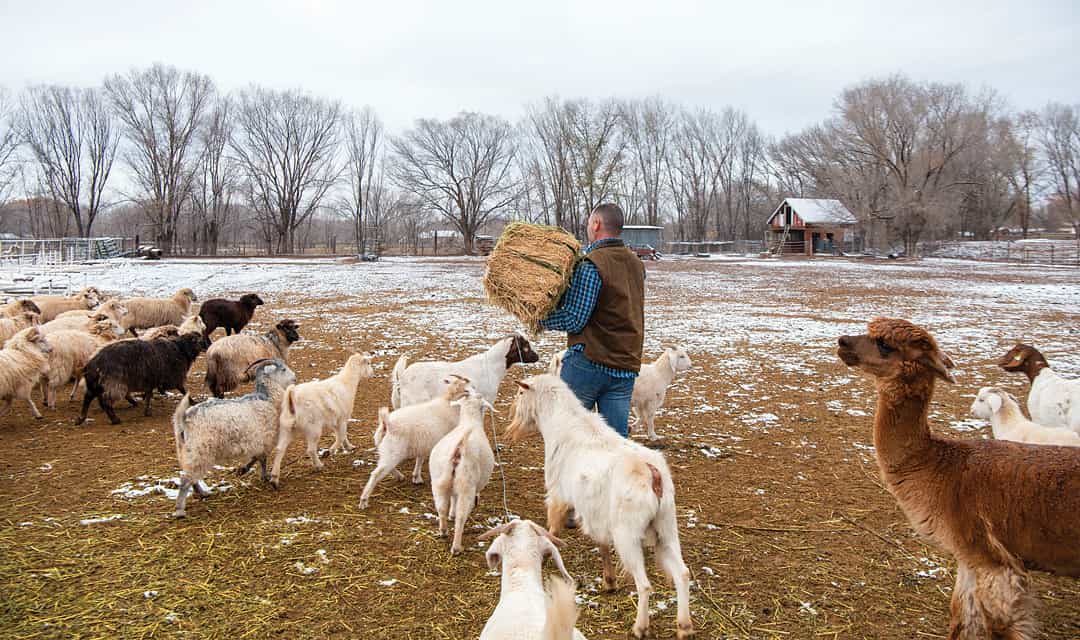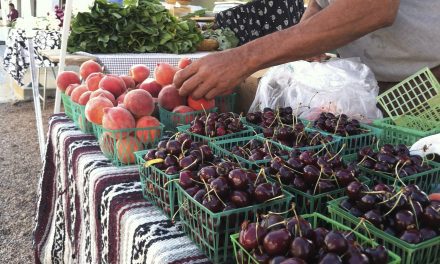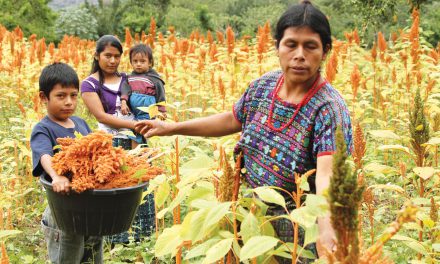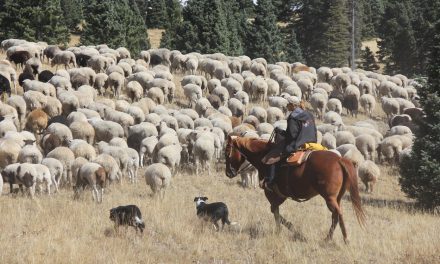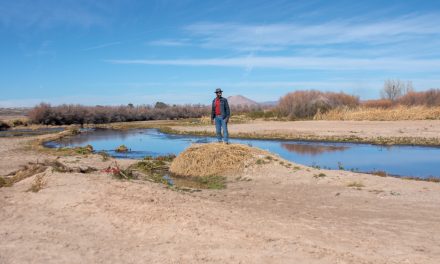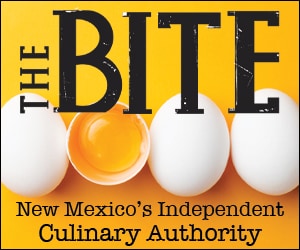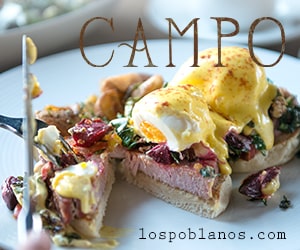Words and Photos by Ungelbah Dávila

Nizhoni, Julianna, John, and Nat’aani Reece, the team at Nizhoni Farms.
After a warm fall, winter has finally visited Valencia County, and the animals at Nizhoni Farms greet us at the gate with a dusting of snow on their fuzzy heads. While the vast variety of produce grown here might be past its season, the farm is far from idle.
Located in Los Lunas, Nizhoni Farms is home to the Reece family and their charming collection of critters—a flock of red hens, a few Narragansett turkeys, a special four-horned Navajo-Churro sheep and its many Churro relatives, a herd of Angora goats, a couple Wagyu heifers, some dogs and cats, an ornery alpaca, a big friendly bull named Ferdinand, and twelve-year-old Todd, a therapy goat and the farm ambassador.
The menagerie chatters at us, bleating, squawking, gobbling, mooing, and batting their big eyes for their breakfast. They seek human affection, and an apple or two, evidence that these animals have only ever known human kindness. Nizhoni, which is the Navajo word for beauty, also means doing things in a good, wholesome way. From their composting method to the care they take in sourcing their seeds, the Reeces practice farming in a Nizhoni way.
The farm first incarnated in 2010 on the Navajo Nation, where Julianna, who is Diné herself, was a physician with the Indian Health Service. Along with creating different community engagement activities, the farm was a way to offer healthy foods to her patients and neighbors.


Top left: John Reece feeding animals. Bottom left: Julianna Reece with Ferdinand the bull. Right: Todd the therapy goat.

“As a physician, I see the health disparities in Native and underserved communities across the nation. It’s really tied to food and what’s happened to our communities historically,” says Julianna. “In America, there’s not a lot of education about food and what goes into our food. I feel like the Western medical model has failed us in many ways and our food industries are problematic. What I tell my patients is just go back to real food. If it wasn’t around two hundred years ago, you probably wouldn’t want to put it in your mouth. That’s what I’ve done in my career, but it connects to what we’re doing at the farm as well.”
When the farm moved with the family to southern Colorado, John, who also has a background in health care, took a larger role in managing it and getting the produce and meat into local farmers markets. While they sell their meat and produce online and at local markets, the family’s mission isn’t to make a huge profit off their farm but to use it as a teaching tool. Even when people are trying to make healthy choices at the grocery store, say the Reeces, many don’t realize that the way commercial food is raised, with pesticides for example, is problematic.
At Nizhoni Farms they start with all organic and heirloom seeds. They are just as careful about where their animals’ feed comes from as they are about how they harvest their animals. They even mix their own chicken feed, which coincides with John’s mission to know exactly what is going into everything he helps grow. From the mutton chops to the kale, everything that Nizhoni sells is raised on their land.
“I’m encouraging people to shop locally and buy local meat and local veggies,” says John. “And not only that, but being brave enough to ask questions: Asking the farmers how they raise their animals. What kind of seeds are they using for their lettuce and kales? Asking all the right questions and just kind of taking an interest in your own health.”
“I think being on a farm really helps you develop an understanding of the cycle of life, how you’re tied to the earth, and what our responsibility is to kind of do things in a good way, and not use all these chemicals and things that are interfering with our health. And then allowing or supporting other folks in being able to do that to some degree,” says Julianna.


Top left: Flock of chickens. Bottom left: Navajo Angora goats.
Right: John tending to broccoli.

John, Julianna, and their two children, Nizhoni and Nat’aani, relocated their farm to Los Lunas in 2018, when Julianna took a job with the Centers for Disease Control and Prevention (CDC) to oversee community-based programs on chronic disease prevention. The move was traumatic for the then ten- and twelve-year-old children, who had to say goodbye to their animals and friends—except for Todd, the smiley goat with big horns who has been with the family from their first farm. The family decided they could not part with Todd, and it was a good thing because he became a source of companionship and comfort for Nizhoni when she began experiencing bullying at her new school.
Today Nizhoni is president of the Native American Student Union for Albuquerque Public Schools, and a member of the Career Enrichment Center, where she takes a Navajo-language class. She is working toward bringing her class to the farm next spring to offer them a butchering demonstration. Keeping their children connected to where their food comes from and how it gets to their plate is also a way that John and Julianna keep them connected to their Diné culture.
In Julianna’s role as director of healthy tribes for the CDC, she works to establish scientific credibility behind the idea that culture is wellness. “Basketmaking, language recognition, all these different types of cultural things that don’t seem like they are directly supporting a health initiative, actually are,” she says. “We’re kind of tying all that into what we do here and making sure that we’re eating healthy and our kids are learning how to eat healthy, so when they go off, they understand what healthy means and are able to share and continue promoting it.”

Ungelbah Dávila
Ungelbah Dávila lives in Valencia County with her daughter, animals, and flowers. She is a writer, photographer, and digital Indigenous storyteller.
